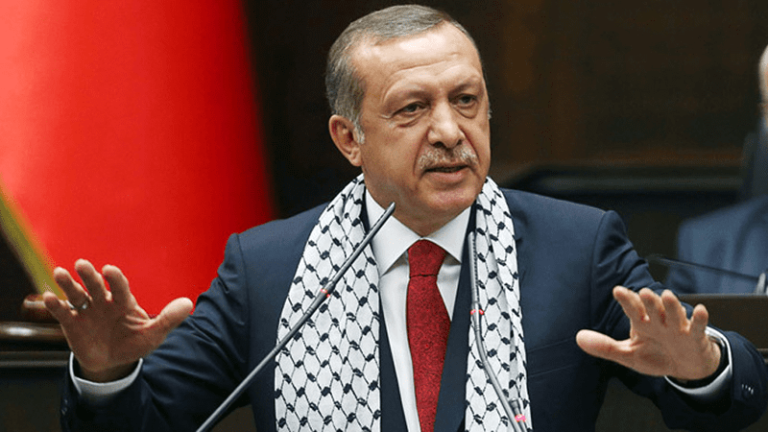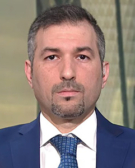
In mid-October, following the UN Security Council’s failure to pass a Russian resolution calling for an immediate humanitarian truce in Gaza, Turkey proposed a “guarantor system” to end the fighting in Gaza and to secure a lasting Palestinian-Israel peace. Turkey’s initiative envisions foreign governments—including Turkey—serving as permanent mediators in the conflict and keeping Israel and the Palestinians in check over possible violations of any peace agreement that is reached.
In an October 16 briefing for the Turkish press, Foreign Minister Hakan Fidan outlined the broad context of the Turkish proposal. Fidan argued that only a two-state solution will bring lasting peace to the region, emphasized the importance of regional ownership to solve the crisis, and stressed the need for the international community to pressure Israel and hold it accountable. On October 21, Fidan formally presented the guarantor proposal at the Cairo Peace Conference on Palestine.
While well intentioned and potentially offering a workable solution to end the Israeli war on Gaza, Turkey’s proposal faces critical limitations in practical application. The biggest limitation is the plan’s reliance on the cooperation and participation of major powers, particularly the United States, whose current policies do not align with Turkey’s vision. The guarantor system proposal assumes that the United States and European powers will compel Israel to establish a sustainable peace and will ensure its compliance with any future peace agreement. But in the current regional and international environment, this is unlikely to occur.
The Proposal’s Core Concept
The guarantor system put forward by Turkey aims to achieve a ceasefire in Gaza, to reach a permanent and sustainable halt in hostilities, and then to transition to achieve an end to the conflict by having a group of international guarantors ensure peace, security, and stability for Israel and the Palestinians. The proposal reflects an understanding of the need for robust mechanisms to ensure compliance with any peace agreements reached. In Ankara’s vision, Turkey would be part of a regional group guaranteeing the Palestinian side, while western governments would serve as guarantors for the Israeli side. The proposal anticipates that the peace guarantors would pressure both sides to prevent breaches of agreements, avoid escalation, and hold violators accountable. In the view of Turkish President Recep Tayyip Erdoğan, the Turkish proposal is currently the most realistic and effective way to achieve a practical solution to the conflict, at least in the short- to medium-term.
On November 1, Foreign Minister Fidan called for a conference aimed at averting the spread of the Israel-Hamas war and discussing alternative solutions, emphasizing the need for a ceasefire that leads to a just and lasting peace. He stressed that Turkey wants to turn the crisis into an opportunity for peace. Speaking to journalists upon his return from the November 10 Arab League-Organization for Islamic Cooperation summit in Saudi Arabia, President Erdoğan argued that Turkey remains a key actor in resolving regional crises, including the Palestine-Israel conflict.
Turkey’s Limitations
Although Turkey was the first Muslim nation to recognize Israel in 1948—mainly for reasons related to its hope of securing western support vis-à-vis the Soviet Union and gaining membership in the North Atlantic Treaty Organization (NATO) alliance—Palestine has always been important for the Turkish public. Palestine also has been a critical issue for most Turkish governments, especially since the early 1960s. Among other developments, the 1964 “Johnson letter”—in which US President Lyndon Johnson urged Turkey against intervening in Cyprus and warned that NATO might not come to Turkey’s defense if the Soviet Union got directly involved in the Cyprus conflict—forced Turkey to chart a new regional foreign policy that was more independent of the United States. This new policy was based upon forging closer relations with the Arab and Muslim worlds, with support for Palestine at its center.
Yet, Ankara has always had limitations, chief among them the lack of direct, high-level involvement with and serious influence over both of the parties to the Israel-Palestinian conflict. Following the rise to power of Erdoğan’s Justice and Development Party (AKP) in 2002, Ankara sought to gain greater influence regarding Palestine, including through pro-active mediation, collective diplomacy, and support for civil society campaigns to break the Israeli siege on Gaza.
The Mavi Marmara crisis was one of the most famous such campaigns. In 2010, a Turkish ship, the Mavi Marmara (which was owned and operated by a charity with ties to the AKP), was part of a flotilla aiming to breach the Israeli maritime blockade of Gaza and deliver humanitarian aid to the enclave. Israeli commandos raided the ship in international waters and killed at least nine activists on board. The incident strained Israeli-Turkish relations and drew significant global attention to the Gaza blockade. An international fact-finding mission appointed by the UN Human Rights Council found that Israeli forces’ actions during the raid were “unlawful” and that the blockade should be considered illegal.
Ankara continues to suffer from a lack of direct influence over the conflict, especially in the face of Israel’s continuing aggression against the Palestinians.
Despite such international support for Turkey’s Gaza policy, Ankara continues to suffer from a lack of direct influence over the conflict, especially in the face of Israel’s continuing aggression against the Palestinians. Erdoğan has conveyed Ankara’s guidelines for improved Turkish relations with Israel, which have been in place for more than a decade and include requiring Tel Aviv to change its policy toward the Palestinians. Turkey cannot be seen as complicit with Israel against the Palestinians or silent on the Israeli aggression against them.
Soon after Hamas’s October 7 attack on Israel, Turkey initially tried to adopt a balanced response. Yet Netanyahu’s decision to invade Gaza, and Israel’s subsequent deliberate and systematic massacre of Palestinian civilians, appears to have put an end to that approach. Ankara has since adopted a different course of action, including recalling its ambassador from Tel Aviv, while promoting its guarantor proposal and giving it diplomatic prominence.
Building Ankara’s Leverage
Contrary to what some observers believe, Ankara lacks serious leverage over Hamas and Israel, in comparison to other countries. This disadvantage deprives Turkey of the necessary standing to play a strong role on the Palestinian file. In this sense, Ankara’s critical position on Israel and supportive position on Hamas and the Palestinians, including President Erdoğan’s rejection of characterizing Hamas as a terrorist organization, should be seen as efforts to build Ankara’s leverage over that organization.
If adopted, the guarantor system could address some of the limitations that make Turkey less effective than other countries on the Palestinian file. The system would create a foothold for Ankara and would facilitate its actual presence on the ground in Gaza politically, militarily, and in humanitarian affairs, thus making it an influential player in the equation. Furthermore, the proposal would lessen influence over Hamas by governments, such as Iran’s, by weakening their unconstructive leverage over the Palestinian side. In contrast to Tehran, Ankara supports the two-state solution and prioritizes the resolution of the Palestinian issue as a stabilizing factor for the region, rather than using it as a tool of an expansionist agenda.
In contrast to Tehran, Ankara supports the two-state solution and prioritizes the resolution of the Palestinian issue as a stabilizing factor for the region.
Although from the Turkish perspective, at least, the proposed system has several benefits, its success hinges on several factors. These include the evolving dynamics of the Israeli-Palestinian conflict, regional geopolitical shifts, and the international community’s willingness to engage with new approaches to conflict resolution.
The Proposal’s Feasibility and Challenges
The proposal depends on acceptance by other parties, including Israel and its key backers, the United States and some European countries. But neither Israel nor the United States has shown much willingness to allow Turkey to play an active role in the Palestinian issue. And neither Israel nor the United States is expected to change their position anytime soon, perhaps because they fear that the guarantor system would highlight Turkey’s regional leadership role and consolidate its status as a regional power.
Indeed, US Secretary of State Antony Blinken skipped Ankara during his first visit to the region following October 7. In response, Erdoğan blamed the United States for prolonging the war and accused it of being complicit in the crimes committed in Gaza. When Blinken decided to visit Ankara on a subsequent regional trip, in November, Erdoğan snubbed him and did not grant him a meeting. Blinken did make Turkey his first stop in his 10-nation regional tour in January 2024. Blinken discussed with Erdoğan and Turkish officials various bilateral, regional, and international issues. Concerning Gaza, Blinken reportedly raised Ankara’s potential contribution to reconstruction efforts in the Strip as well as what Turkey could do to exert influence, including on Iran, to ease regional tensions and to speed up humanitarian aid to Gaza.
Blinken reportedly raised Ankara’s potential contribution to reconstruction efforts in the Strip as well as what Turkey could do to exert influence to ease regional tensions.
As for Israel, it would prefer to credit any political role on the conflict to parties such as Egypt, which borders Gaza, or countries that signed the Abraham Accords—Bahrain, Morocco, and the United Arab Emirates. As for the United States, Washington typically prefers to credit countries such as Qatar for mediating between Israel and Hamas. Reportedly, Qatar established a channel with Hamas in Doha in 2012 at the request of the United States, with the aim of maintaining open lines of communication and promoting peace and stability in the region. Moreover, Arab countries, some of which under Turkey’s plan would serve as guarantors for the Palestinian side, have not shown enthusiasm for the idea.
The United States and other Western powers traditionally allied with Israel, such as the United Kingdom and Germany, have no serious willingness to pressure Tel Aviv. Their position reflects a longstanding pattern of unhelpful behavior that destabilizes the region and destroys the international system and norms. The European Union, which is also broadly supportive of Israel, has not committed to any substantive role in the Turkish proposal.
One conceivable scenario in which the guarantor system could gain support in the current environment would be for western countries to agree to Turkey’s proposal to avoid being seen as complicit in Israel’s crimes against the Palestinians in Gaza—which many experts argue amount to genocide. Another scenario would be if a new government in Israel approved the guarantor proposal following Israel’s inability to defeat Hamas, or acceptance of the two-state solution. Yet an increasing number of experts find a two-state solution impossible to achieve, due to Israel’s systematic sabotage of this option in recent decades.
Thus, there are no indicators at present that western countries would approve the Turkish guarantor proposal or take part in it. Even if the proposal were to be accepted by western countries, the challenge of how to force Israel to commit to any peace agreement would remain, as the Zionist state continues to deny Palestinians essential rights and refuses to deal with them as equals.
The views expressed in this publication are the author’s own and do not necessarily reflect the position of Arab Center Washington DC, its staff, or its Board of Directors
Featured image credit: President of Turkey

